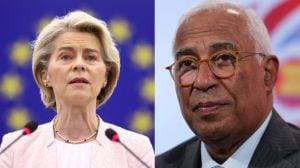Rail Budget: Hapless UPA watches Didi roll back Railway Minister
Dinesh is sacked for raising fares,Cong gets some comfort from SP
The UPA was pushed to the wall again tonight by the Trinamool Congress and its increasingly capricious chief Mamata Banerjee who sought the sacking of her seniormost nominee in the union cabinet,Railway Minister Dinesh Trivedi,hours after he proposed a hike in passenger fares,the first in 10 years.
The government is said to have agreed to Banerjees request faxed to the Prime Ministers Office to replace Trivedi with Mukul Roy who is currently minister of state for shipping. This,ironically,hours after Prime Minister Manmohan Singh applauded Trivedis budget as forward looking.
When contacted,Trivedi told The Indian Express: If she (Mamata) wants to remove me,I will go,what can I do?…No one from the party has spoken to me and I have not tried reaching out to anyone. I have not thought of any future plans.
Roy,known as Mamatas right-hand man,has had an earlier stint as minister of state for railways. On July 11 last year,he refused to visit the site of the Guwahati-Puri Express derailment in Assam saying that it was the PM,and not he,who was in charge of Railways.
Later in the evening,Congress president Sonia Gandhi met the Prime Minister and the partys crisis managers including Pranab Mukherjee tried to reach out to Mamata. With Trivedi out,the Government is faced with an unprecedented situation: either the new Minister seeks passage of the Budget after rejecting the fare hike or the Prime Minister takes over the Ministry and seeks passage of the Budget.
A glimmer of hope for the Congress came from the Samajwadi Party,which has 22 members in the Lok Sabha against Mamatas 19,after it ruled out pulling down the government on this issue and said that it would provide in-principle support to a fare hike minus the hike for poorest travellers.
In fact,the SPs stand was in stark contrast to that of the TMC. We are in-principle in support of the rail fare hike as it has come after a gap of eight to nine years during which the fuel prices have gone up. There are limitation to the extent the freight can generate resources for such a vast network and railways urgently require resources for safety and passenger amenities, SPs chief whip in the Lok Sabha Shailendra Kumar told The Indian Express over phone while travelling to Lucknow for Akhilesh Yadavs swearing-in ceremony as UP Chief Minister tomorrow.
Kumar,however,suggested that the fare hike should not burden the poorest of the poor who travel in general compartments of trains and also in Sleeper Class. The government should try to minimise the burden on them. The hike (that affects them) can be rolled back while retaining it for higher categories of passengers, he added.
SPs chief whip,however,sought to distance himself from the developments within the UPA ranks terming it as an internal matter of the UPA and TMC on which the SP would not like to comment. We support the government from outside. We will reason out why they should exempt the general class travellers from the fare hike. No one wants a mid-term election and there would not be mid-term election, he said.
Earlier,Rail Bhawan sources close to Mamata Banerjee claimed that Trivedi had not consulted the party leadership on the hike. Incidentally,Trivedi last met Mamata on March 9 in Kolkata when she convened a meeting of her parliamentary party to decide on the floor strategy during the budget session.
The meeting convened at Writers Buildings had 24 TMC MPs of LS and RS turn up including Trivedi. Significantly,Mamata and Trivedi had a one-on-one meeting for nearly half an hour that day. Ever since Trivedi took charge as Railway Minister,there have been 12 Railway programmes in West Bengal.
Trivedi was present at six of these where he shared the stage with Mamata. Just before the March 9 meeting,the two were in Darjeeling on February 28 inaugurating new projects.
Today,soon after the Budget announcement,Mamata,at at function in Nandigram,spoke to her senior MPs directing the next course of action. With the TMCs leader in the Lok Sabha Sudip Bandyopadhyay categorically distancing the party from the Rail Budget and MPs like Chief Whip Kalyan Banerjee and Derek OBrien openly trashing the Rail Budget through the evening,Trivedi looked increasingly isolated.
What cost his job: bold budget,new tariff ideas
On Wednesday,Railway Minister Dinesh Trivedi lost his job for doing what two of his immediate predecessors one of them his own party boss could not. After 10 years,fares of passenger trains were finally increased in the rail budget that Trivedi presented,with the aim of pumping in much-needed funds into the financially ill national transport utility.
Rolled out in two forms,the fare rationalisation models are expected to leave the Railways richer by between Rs 4,000 crore and 7,000 crore annually,by making train fares 10-20 per cent higher across classes depending on the distance travelled.
Trivedi also spelled out a plan to balance fluctuating fuel costs with train fares and laid out a roadmap for a major revamp in the Indian Railways Board,aimed at making the Railways more modern and safe.
An independent Rail Tariff Authority,subject to approval by Parliament,will from now on fix fares,and thereby take away the railway ministers exclusive powers on fare revisions.
I have successfully brought the Railways out of the intensive care unit, Trivedi said minutes after delivering the budget.
His plan outlay of Rs 60,100 crore is the highest ever,about Rs 3,000 crore more than last years outlay earmarked by Mamata Banerjee. I had to do it to save the Railways, Trivedi said.
As per his proposals,fares will rise by 2 paise per kilometre for suburban and ordinary second class and 3 paise per km for mail/express second class both unreserved classes,said to be transporters of the poor.
In the reserved classes,non-AC sleeper will see an increase of 5 paise per kilometre,while AC-3,2 and 1 will see increases of 10 paise,15 paise and 30 paise per kilometre,respectively.
Typically,a journey on the Mumbai Rajdhani from Delhi in AC-3 will cost Rs 1,440,up from Rs 1,302 about a 10 per cent increase. For AC-1 and 2,the increases will be between 10 and 15 per cent. For the non-AC sleeper classes,the jump is a little over 20 per cent.
For the Railways,the two classes bleeding its coffers over the years sleeper and unreserved berths will now see some income.
In another rationalisation move,Trivedi proposed a novel round off mechanism,wherein fares would be rounded off to the next possible five rupees. For instance,a fare of 146 would become 150. But theres a concession for local trains,where downward rounding off has also been allowed,in which case,a fare of Rs 11 would become Rs 10.
Trivedi has done major restructuring of the Railway Board as well by proposing two new members. A new Member (Public-Private Partnerships and Marketing) will oversee investment opportunities in the Railways for private players and look for more ways to earn money from non-conventional sources. Member (Safety),on the other hand,will look after critical safety upgrade as envisaged in the Anil Kakodkar panel on railway safety recently.
Talking about an eventuality of the Trinamool Congress forcing a rollback of the hikes by way of a cut motion in his budget,Trivedi said it would be detrimental for the Railways. A rollback in the hikes would be a rollback in safety, he said.



- 01
- 02
- 03
- 04
- 05




























